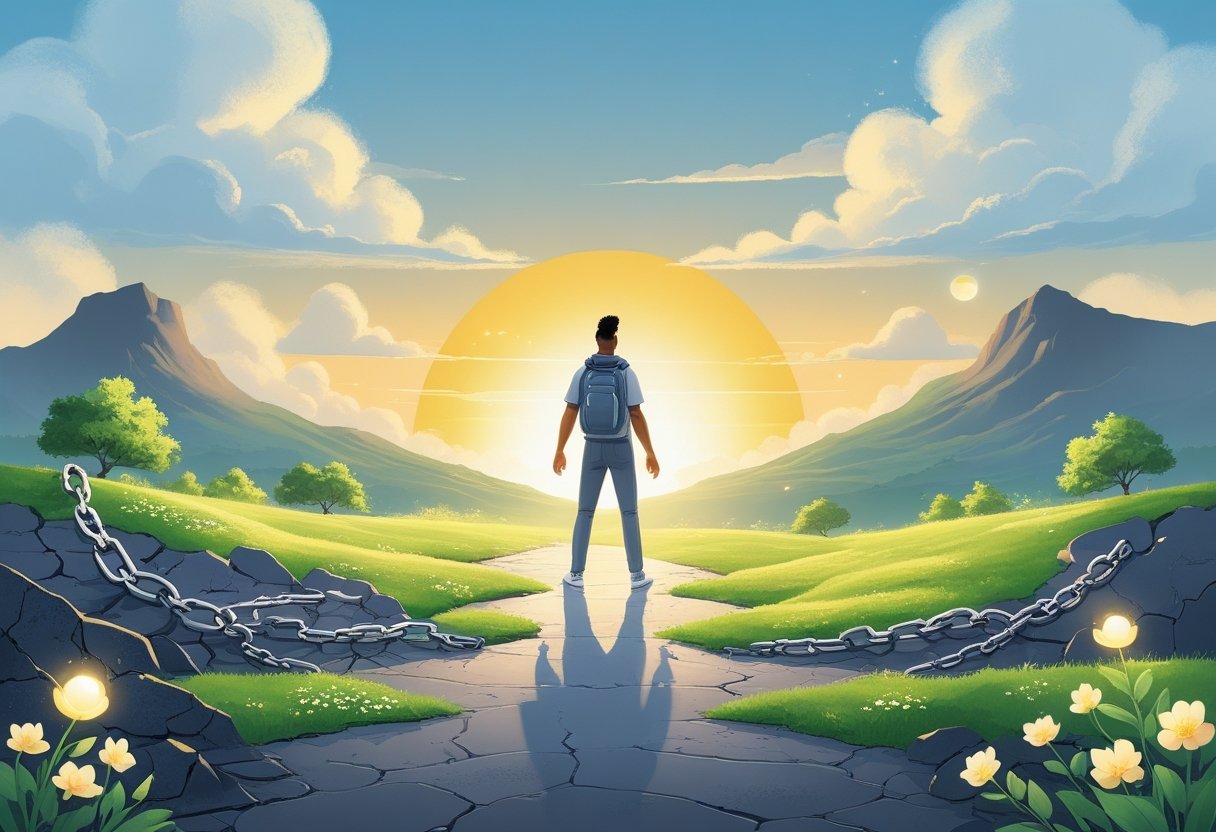Physical Address
304 North Cardinal St.
Dorchester Center, MA 02124
Physical Address
304 North Cardinal St.
Dorchester Center, MA 02124

Failure is a part of every journey, yet too often we see setbacks as a stopping point instead of a valuable crossroads. We unlock real growth when we embrace failure as a learning opportunity, using each defeat as a chance to try again with new insight. By reframing how we view setbacks, we remind ourselves that failure is not the end of the road, but rather an opportunity for personal and professional development that can lead to greater success, which is often misunderstood as the opposite of success that may not have been possible through success alone.

Many of us have experienced moments when plans did not work out as intended and goals felt just out of reach. Embracing these moments is not only about resilience, but also about transforming challenges into opportunities for new experiences and growth. Stories and research show that taking this approach leads to long-term benefits and a mindset that welcomes new possibilities.
By sharing what we learn from our failures and staying persistent, we build a journey unique to us. This continuous learning mindset changes how we react to adversity and empowers us to take actionable steps forward. When we actively choose to learn from failure, we set the stage for future success and personal fulfillment.

Failure is not a single event but a complex and deeply personal experience. By recognizing its many forms, we can develop realistic perspectives, identify underlying causes, and unlock valuable lessons.
Failure can take many shapes—missed deadlines, unsuccessful projects, or not achieving set goals. It’s usually defined by the gap between our intentions and the actual outcome. Sometimes, what counts as failure for one person might not matter for someone else, making the concept highly subjective.
We should note that external standards, such as academic grading or business metrics, can formalize what counts as failure. However, internal expectations, such as personal dreams or promises to ourselves, play just as critical a role. This subjective nature means that understanding our unique definitions of failure is essential before moving forward.
The reasons we fail are often varied and complex. Lack of preparation, unrealistic expectations, or external factors like changes in the market can all contribute. Taking on too much at once or neglecting to adapt to feedback are also frequent culprits.
Sometimes we underestimate the importance of timing or teamwork. Even with strong skills and a clear plan, unexpected circumstances—such as illness, accidents, or economic shifts—can lead to undesired results. Recognizing these factors allows us to plan better and reduce preventable mistakes.
Key drivers behind failure:
|
Cause |
Example |
|---|---|
|
Poor planning |
Unclear schedules, lack of resources |
|
Miscommunication |
Team misunderstandings |
|
Overconfidence |
Ignoring risks |
|
Lack of adaptability |
Resisting feedback or change |
|
External disruptions |
Economic downturns, unexpected crises |
How we view failure is often shaped by our upbringing, community, and culture. In some environments, failure is stigmatized or seen as a sign of weakness or incompetence. In others, it’s regarded as a powerful tool for growth and learning.
Personal beliefs also matter. Some of us internalize failure, letting it impact our confidence and self-worth. Others approach it analytically—seeing setbacks as learning opportunities. According to research, understanding and accepting failure can reveal our inner resilience, making us more prepared to embrace new challenges and seize future opportunities.
Open conversations about mistakes can help us reframe their meaning and reduce the fear associated with them.
Failure can prompt self-reflection and motivated change. Each setback gives us information about what doesn’t work, encouraging us to adjust strategies and clarify our goals. We often discover strengths we didn’t know we had in difficult times.
Research shows that embracing failure helps us develop resilience, creativity, and problem-solving skills. Reflecting on what went wrong enables us to grow wiser and make more informed decisions in the future.
It is in facing and analyzing our failures—rather than avoiding them—that we gain a deeper understanding of ourselves and lay the groundwork for future achievements.

Setbacks are part of any journey, but developing key psychological skills helps us use them as stepping stones to success. Applying proven strategies allows us to turn disappointments into valuable growth opportunities.
Cultivating a growth mindset means seeing abilities as skills we can develop through dedication, instead of fixed traits. When we encounter obstacles, this mindset helps us focus on learning and improvement rather than feeling defeated, viewing challenges as a temporary setback.
Research shows that those who view challenges as chances to grow and maintain a positive mindset build greater resilience over time. In practice, we can reframe setbacks as feedback and use questions like, “What can we learn here?” or “How will this help us adapt?” This shift supports persistence even when tasks become difficult.
Adopting this approach encourages us to embrace discomfort and uncertainty without withdrawing. It’s an essential part of the psychology of success.
Fear of failure can be paralyzing, preventing us from trying new things or pursuing meaningful goals. Many people associate failure with personal shortcomings, making setbacks emotionally challenging.
By normalizing failure as a natural part of growth, we can reduce its sting. One proven way to manage fear is to reframe failure as a teacher—something that provides necessary information for improvement. Listing out specific lessons learned after a setback helps us focus less on the negative emotions and more on practical growth.
Emphasizing progress rather than perfection, and celebrating small wins, gradually lowers our sensitivity to setbacks. The key is to see failure as an opportunity to adjust and get closer to success.
Emotional intelligence enables us to process difficult feelings constructively when setbacks occur. It involves recognizing, understanding, and managing our emotional responses, which helps us remain focused and balanced.
Practicing self-awareness lets us identify discomfort or frustration quickly, instead of ignoring or denying these feelings. Self-regulation is crucial; strategies like pausing to reflect, using deep breathing, or writing down our thoughts can help manage stress.
Empathy and social skills further support us during tough times. By seeking feedback from trusted peers or mentors, we can gain perspective and support, which strengthens resolve. Developing emotional intelligence not only helps to navigate setbacks, but also enriches our personal and professional relationships, as explored in guides on personal development and resilience.

Each of us faces a path shaped by our individual backgrounds, challenges, and achievements. Understanding and valuing these differences is important to turn setbacks into chances for personal development.
Our personal and professional journeys rarely follow a straight line. Life events, failures, and successes all create distinct learning moments. By recognizing that no two paths are identical, we can avoid unnecessary comparisons and negative self-judgment.
We benefit from examining how others have approached setbacks, yet we also honor our individuality by resisting the urge to measure up to others’ timelines. Even research from self-development literature highlights the importance of accepting our unique paths and using setbacks as opportunities to adjust and refine our efforts, strengthening our resolve, as described in Unleash the Warrior Within: Embrace Your Gifts & Conquer Every Challenge at Google Books.
By acknowledging and valuing our individual progress, we become better equipped to spot hidden opportunities within our failures. This mindset not only encourages personal growth but also leads us to a more authentic sense of accomplishment.
Improving our ability to reflect on experiences and becoming aware of our responses allows us to learn more deeply from failure. Regular self-reflection helps us identify personal strengths, weaknesses, and the recurring patterns in our actions.
Methods such as journaling, mindfulness, and honest self-evaluation can help us become more attuned to our emotional and mental states, promoting better mental health. When we understand our thought processes, we can better separate constructive feedback from unhelpful self-criticism.
By prioritizing self-awareness, we are more likely to spot growth opportunities even in disappointment. Embracing our flaws as intrinsic aspects of our identity, as mentioned in Unleashing Your Potential: A Journey of Self-Discovery and Personal Growth available at Google Books, enables us to move forward with greater resilience and improved self-understanding.

Turning setbacks into valuable lessons requires deliberate strategies and a willingness to adapt. By actively embracing change, we position ourselves to harness failures for meaningful progress.
Mistakes provide direct insight into what does and doesn’t work. We benefit by analyzing each misstep, identifying specific causes, and documenting lessons learned. Developing a systematic approach—such as creating a table of errors and actions taken—helps us avoid repeating the same issues in the future.
|
Mistake Made |
Root Cause |
Lesson Learned |
Action Taken |
|---|---|---|---|
|
Missed Deadline |
Poor Time Planning |
Use time-blocking method |
Implemented calendar |
|
Product Defect |
Inadequate Testing |
Strengthen QA process |
Hired QA specialist |
Reviewing our actions encourages growth and resilience. Research suggests that those who reflect on failures, rather than ignore them, experience greater personal and professional growth.
Setting goals that are achievable, measurable, and clearly defined is vital after experiencing setbacks. When we understand our limits and capabilities, we avoid frustration and foster steady improvement.
Breaking large objectives into smaller, manageable tasks makes success more consistent. For instance, instead of aiming for “rapid revenue growth,” we might focus on “gaining five new clients per month.” This approach tracks concrete progress and adapts goals based on current results.
Using tools like SMART goals (Specific, Measurable, Achievable, Relevant, Time-bound) helps us create actionable plans. Regularly reviewing these targets promotes accountability and maintains motivation without setting ourselves up for disappointment.
Seeking honest feedback from peers, supervisors, or industry experts accelerates our development. Constructive criticism pinpoints blind spots and reveals areas needing adjustment. We can request feedback through surveys, meetings, or informal conversations for broader perspective.
Mentorship, especially from those who have overcome similar failures, provides guidance and support along our journey. Studies on transformative leadership demonstrate that effective mentors help us reframe setbacks and encourage experiments while minimizing repeated errors.
Building a robust network of advisors ensures we remain accountable and motivated. Engaging regularly with mentors and feedback loops results in better decision-making and sustained growth.

When we encounter failure, it can often lead to new insights and growth. By approaching setbacks as learning moments and recognizing the negative outcome aspects, we can discover creative solutions, adapt to changing circumstances, and use our experiences to build future success.
Failure often reveals gaps in our approach or understanding, prompting us to look for alternatives. We can turn challenges into chances for innovation by evaluating what went wrong and generating fresh ideas based on these insights. For instance, teams that reflect on their mistakes are more likely to brainstorm unique solutions and achieve better outcomes.
To foster innovative problem solving, we should:
Embracing a culture that sees failure as input for continuous improvement allows us to become more adaptable and resilient in the face of adversity. This mindset keeps us moving forward instead of getting stuck, aligning with the view that transforming challenges into opportunities is crucial for development.
Every failure provides a chance to reassess our direction and uncover valuable insights into paths we might not have considered. We might stumble onto strengths or interests that were previously hidden, or discover markets and solutions beyond our original plan. It’s important to step back and evaluate our experiences objectively.
We should list out what has changed because of failure:
By mapping these changes, we can spot fresh opportunities that might have seemed impossible before. Learning from failure allows us to pursue new goals with evidence-based confidence.
Instead of viewing setbacks as endpoints, we can reinterpret them as important steps on our journey. Each disappointment can be a milestone marking progress, highlighting what we’ve learned and how we’ve grown. This perspective change supports sustained motivation and long-term achievement.
A practical approach is to document our setbacks and identify key lessons gained from each. Recognizing these milestones helps us track how far we’ve come and maintain optimism through future challenges. When we treat every experience as valuable data, embracing our failures becomes a tool for creative growth rather than discouragement.

When we look beyond setbacks, we often discover opportunities that drive personal growth. The journey from failure to achievement is shaped by practical action, self-reflection, and perseverance.
Many individuals have faced repeated setbacks before achieving their goals. For example, entrepreneurs like Sara Blakely, founder of Spanx, openly share how numerous rejections and early obstacles paved the way for success. After being turned away by countless manufacturers, Blakely kept refining her idea until she finally found someone willing to produce her product.
Students and professionals from diverse backgrounds have stories in which a failed exam, lost job, or rejected proposal became the catalyst for finding a better path. Embracing these failures allowed them to reassess goals, develop new skills, and identify unique strengths. Books like Facing Failure and Failing Forward illustrate how embracing setbacks can lead to meaningful change.
Key strategies that appear in these journeys include:
Notable figures across industries have transformed public and personal failures into stepping stones. Thomas Edison conducted thousands of unsuccessful experiments before inventing a functional lightbulb. He is often quoted for reframing each failure as a lesson in what does not work rather than a defeat.
Walt Disney was fired from an early job for “lacking imagination.” Instead of giving up, he used criticism as motivation to pursue creative projects, eventually building one of the most successful entertainment companies in history. These examples are reinforced in The Obstacle is the Way, which highlights how overcoming obstacles leads to innovative thinking.
Their stories show the importance of persistence, reframing setbacks, and maintaining focus on long-term vision. By modeling this mindset, we create opportunity out of difficulty.
Learning from failure shapes our resilience and helps us develop valuable traits that contribute to sustained success. By actively responding to setbacks, we enhance both our ability to adapt and our willingness to take strategic risks.
Embracing failure over time improves our self-assurance while also helping us confront our insecurities with kindness. Each challenge we face provides practical experience, making us less fearful of future setbacks and more willing to explore unfamiliar paths. By reviewing what happened and identifying what went wrong, we systematically build reliable problem-solving skills.
This consistent reflection sharpens our adaptability. We learn to adjust quickly when circumstances change, using past missteps as guidance for improved decisions. According to research, organizations that focus on learning from deviation rather than assigning blame develop this adaptability as a core strength, leading to long-term agility. Examples include teams that regularly review outcomes, openly discuss errors, and update strategies based on lessons learned. This steady practice boosts our collective confidence and prepares us for sustained progress (read more).
A culture that values growth encourages us to treat failure as a learning opportunity rather than a setback. When we openly discuss mistakes and share insights, we help each other see challenges as points for improvement.
This approach leads to lasting improvements in our mental wellbeing and quality of life, as suggested in research exploring the link between reflection and long-term wellness (more detail). Teams that accept errors as part of the journey can support one another during challenges, creating an environment of trust. We see that accountability and honest conversations about setbacks contribute to innovative thinking and greater achievement in the long run.
Key practices include:
When we encounter setbacks, our first step is to practice self-reflection. Taking a moment to assess what went wrong, especially in a similar situation, allows us to identify real causes and prevents repeated mistakes.
Next, we reframe our mindset. Viewing failures as chances for learning instead of dead ends helps us see each challenge as an opportunity for growth. This shift enables us to approach the future with curiosity rather than fear.
To make progress, we set specific, achievable goals based on lessons learned. Clear goals give us direction and allow us to track improvements over time.
Let’s consider these steps in table form for clarity:
|
Step |
Action |
|---|---|
|
Self-Reflection |
Identify what happened and why |
|
Mindset Shift |
See failure as a development opportunity |
|
Goal Setting |
Define realistic, measurable next steps |
We can also lean on our support networks. Connecting with mentors, peers, or colleagues gives us new perspectives and encourages accountability. Collaboration often leads to creative solutions.
Finally, we act with consistency. Progress requires persistence, so we commit to applying what we’ve learned even when success isn’t immediate. Over time, these actions help us build resilience, as highlighted in books like The Extraordinary Within.
When we encounter failure, we gain a unique chance to learn, reflect, and grow. Instead of viewing setbacks as the end, we can treat them as stepping stones for future success.
By reframing challenges, we allow ourselves to see unexpected routes and open new possibilities. Recognizing failure as a learning opportunity prepares us for the demands ahead.
Key actions to embrace our journey:
This approach frees us from the pressure of perfection and helps us accept our authentic selves, as highlighted in Unleashing Your Potential.
Let’s move forward, ready to transform setbacks into opportunities. Every failure holds something valuable for our ongoing journey.
Failure can be a catalyst for growth, teaching us practical strategies for resilience, adaptability, and innovation. In this blog, by understanding specific approaches to learning from setbacks, we can improve our personal development and foster creativity in our work.
We learn that setbacks offer valuable feedback about our methods and decisions. Failures highlight areas needing improvement and reinforce the importance of perseverance. Understanding the reasons behind a failure can help us avoid making similar mistakes in the future.
Failure allows us to identify gaps in our knowledge or approach and motivates us to adopt better solutions. Each misstep becomes an opportunity to test new ideas, adjust our tactics, and build resilience. We often find that reflecting on our failures is essential for growth and opportunity.
Recognizing and acknowledging our feelings is a key first step. Engaging in open discussions with trusted peers or mentors can help normalize setbacks. We benefit from focusing on constructive actions, such as setting realistic goals and celebrating small wins to regain momentum.
Failure encourages us to develop new skills, reconsider assumptions, and become more adaptable. Each experience dealing with adversity strengthens our ability to handle future challenges. Our journey becomes richer as we learn to view obstacles as essential parts of personal development.
When we treat failure as experimentation, we create space for new ideas to flourish. Organizations and individuals that embrace setbacks tend to iterate quickly and discover unconventional solutions. This willingness to accept uncertainty often results in greater creativity and innovation.
Effective leaders tend to approach setbacks with transparency and accountability. They analyze what went wrong, adjust their strategies, and support their teams through transitions. By modeling resilience, they encourage a culture where learning from setbacks is both accepted and expected.